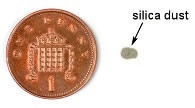By breathing in respirable crystalline silica dust, a worker could develop the following lung diseases:
Silicosis – a progressive disease which can cause severe breathing problems and increases the risk of lung infections and even death. Silicosis usually follows exposure to Respirable Crystalline Silica (RCS) over many years, but extremely high exposures can cause acute silicosis more quickly. A video case study featuring Terry, a former stoneworker, highlights the impact of silicosis following prolonged exposure to RCS.
Chronic obstructive pulmonary disease (COPD) – a long-term illness where the lungs and airways are damaged making it difficult to get air in and out of the lungs. It includes diseases such as bronchitis and emphysema. Symptoms include shortness of breath (even when walking), a persistent chesty cough and phlegm, wheeze and more frequent and troublesome chest infections. COPD may be caused by breathing in any fine dusts, including RCS. It can be very disabling and is a leading cause of death. Cigarette smoking can make it worse.
Lung Cancer - heavy and prolonged exposure to RCS can cause lung cancer. When someone already has silicosis, there is an increased risk of lung cancer. Recent figures suggest an estimated 25 deaths every year in Northern Ireland due to lung cancer as a result of exposure to silica.
Although the health conditions associated with exposure to RCS are very serious, the health risks from RCS are insignificant when exposure to dust is adequately controlled.
The largest amount of silica someone should be breathing in a day after using the right controls is shown below next to the penny.

Back